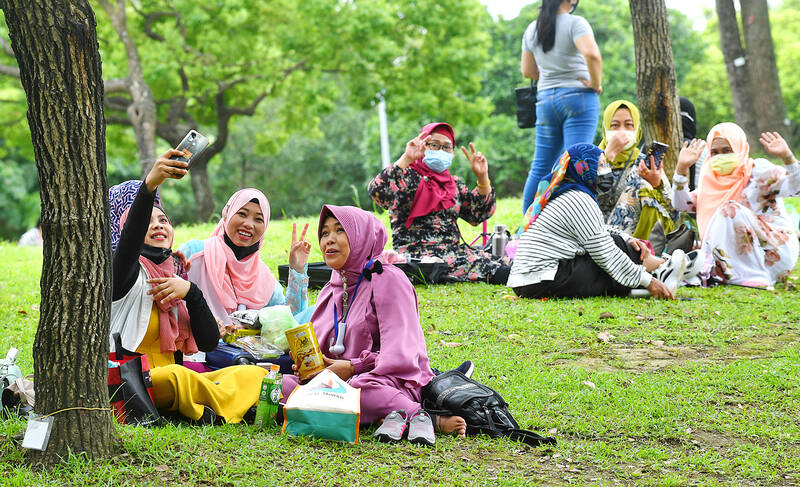Migrant workers employed in manufacturing and construction sectors last year earned NT$32,303 per month on average, while domestic caregivers earned NT$21,000, the Ministry of Labor (MOL) said yesterday.
Average migrant worker wages in the manufacturing and construction sectors rose NT$1,762, or 5.8 percent, from a year earlier, the ministry said, citing a survey of employers of industrial workers and domestic caregivers conducted in July and August last year.
The figures represent a 5.21 percent increase in the minimum wage for migrant workers, to NT$25,250 a month, the ministry said.

Photo: CNA
Migrant workers in the industrial sector last year earned an average regular salary of NT$26,066 a month, up 5.9 percent from 2021, while overtime pay averaged NT$5,619 a month, up 4.1 percent annually.
About 42 percent of the surveyed manufacturers applied to hire migrant workers last year, while 24 percent said they did not fill their quota for migrant workers, due mainly to the COVID-19 pandemic and cost considerations, the ministry said.
Last year, average working hours for industrial migrant workers fell one hour per month from a year earlier to 203.1 hours, with regular working hours averaging 167.6 and overtime working hours averaging 35.5, down 0.1 hours and 0.9 hours respectively, the ministry said.
The survey, which collected 4,573 valid questionnaires from employers in the manufacturing and construction sectors, found that 34.7 percent of industrial sector employers had trouble managing migrant workers.
The biggest issue was difficulty communicating due to language barriers, the ministry said.
Migrant caregivers, who are not covered by the nation’s minimum wage laws, earned an average of NT$20,533 per month last year, up 1.6 percent from a year earlier, the ministry said, citing 4,007 valid questionnaires collected from employers of migrant caregivers.
That included regular salary of NT$17,961, up 2.3 percent from a year earlier, and overtime pay of NT$2,135 per month, down NT$47 year-on-year, the ministry said.
Migrant caregivers worked an average of 10 hours per day, while 49.4 percent of surveyed employers said their caregivers took days off during holidays.
Employers whose caregivers did not take days off said it was because the caregivers wanted to earn more overtime pay, the ministry said.
When their caregivers took days off, 74 percent of employers resorted to using alternatives, which mostly involved family members taking over the caregivers’ duties, the survey found.
About 21 percent of the employers said they experienced problems with their migrant employees, citing difficulty communicating and workers spending too much time on their phones.
As of the end of November, Taiwan had 505,959 industrial migrant workers and 201,406 migrant domestic caregivers, the ministry said.

US President Donald Trump said "it’s up to" Chinese President Xi Jinping (習近平) what China does on Taiwan, but that he would be "very unhappy" with a change in the "status quo," the New York Times said in an interview published yesterday. Xi "considers it to be a part of China, and that’s up to him what he’s going to be doing," Trump told the newspaper on Wednesday. "But I’ve expressed to him that I would be very unhappy if he did that, and I don’t think he’ll do that," he added. "I hope he doesn’t do that." Trump made the comments in

NOT AN OPENING: Trump’s violation of international law does not affect China’s consideration in attacking Taiwan; Beijing lacks capability, not precedent, an official said Taiwanese officials see the US’ capture of the president of Venezuela as a powerful deterrent to Beijing’s aggression and a timely reminder of the US’ ability to defeat militaries equipped with Chinese-made weapons. The strikes that toppled Venezuelan President Nicolas Maduro signaled to authoritarian leaders, including Chinese President Xi Jinping (習近平), US President Donald Trump’s willingness to use military might for international affairs core to US interests, one senior official in Taipei’s security circle said. That reassured Taiwan, the person said. Taipei has also dismissed the idea that Trump’s apparent violation of international law could embolden Beijing, said the official, who was not

A cold surge advisory was today issued for 18 cities and counties across Taiwan, with temperatures of below 10°C forecast during the day and into tonight, the Central Weather Administration (CWA) said. New Taipei City, Taipei, Taoyuan and Hsinchu, Miaoli and Yilan counties are expected to experience sustained temperatures of 10°C or lower, the CWA said. Temperatures are likely to temporarily drop below 10°C in most other areas, except Taitung, Pingtung, Penghu and Lienchiang (Matsu) counties, CWA data showed. The cold weather is being caused by a strong continental cold air mass, combined with radiative cooling, a process in which heat escapes from

Snow this morning fell on Alishan for the first time in seven years, as a strong continental cold air mass sent temperatures plunging across Taiwan, the Central Weather Administration (CWA) said. The Alishan weather station, located at an elevation of about 2,200m in central Taiwan, recorded snowfall from 8:55am to 9:15am, when the temperature dropped to about 1°C, the CWA said. With increased moisture and low temperatures in the high-altitude Alishan area, the conditions were favorable for snow, CWA forecaster Tsai Yi-chi (蔡伊其) said. The last time snow fell at the Alishan weather station was on Jan. 10, 2018, while graupel fell there